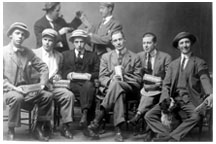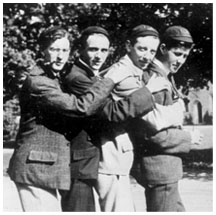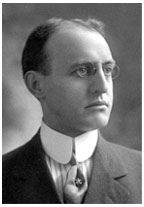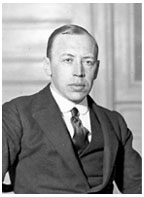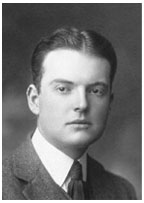March 12, 2003: Features

|
This photo from Class of 1907 pictures some of the first students to experience precepting; top left, President Woodrow Wilson 1879
Members of an unidentified student club from the Class of 1907. Edward Corwin, preceptor turned Constitutional scholar The English poet Alfred Noyes held a model precept in the mid-1910s. Critic Edmund Wilson ’16, a product of precepting |
Precepting:
Myth and reality
of a Princeton institution
by Professor Anthony Grafton
While precepting at Princeton today is both less spectacular, and less unusual, than Princetonian myth and propaganda maintain, at its inception in 1905, Woodrow Wilson’s preceptorial system was indeed unique. When Wilson became Princeton’s president in 1902, university life centered around football, fraternities and eating clubs, dramatic societies, and comic papers. Instruction took the form of professors dictating in large lecture halls for an entire hour, while in smaller classes, teachers examined students on textbooks and lectures – paragraph by paragraph, fact by fact. Students slept, poked each other, or fidgeted until the instructor called on them, and the atmosphere was one of torpor mixed with terror.
Wilson set about changing this by trying to create gentleman scholars, starting with a new system of preceptorials. Following is an excerpt from a recent talk by Anthony Grafton, the Henry Putnam University Professor of History and chairman of the Council of the Humanities, on Wilson’s effort – and how the system ultimately unleashed an even more dramatic series of events, ending with Wilson leaving the university he had dominated for two decades. Grafton’s complete talk will be published in a forthcoming edition of the Princeton University Library Chronicle.
How then to make students men – not in the sense they themselves preferred, but in the reformer’s new, intellectual one? Wilson grappled with this problem from his arrival at Princeton, when he cooperated with idealistic undergraduates to establish the honor system – itself predicated on the new idea that manliness might require one to turn in one’s fellow students rather than to protect them when they cheated. He drew up a new and influential curriculum, a compromise between the old uniform course of study and modern needs and interests. It decanted freshmen into large-scale survey courses, but then required them to choose in their third and fourth years a special field of concentration.
Wilson did not shy from radical changes in the university’s structure. To make specialized study possible for undergraduates, he divided the faculty into departments of classics and English, history, politics and economics, and other fields. But eventually he became convinced that institutional change was not enough. It would take a new kind of teaching to give Princeton manliness an intellectual dimension.
Wilson was no wild-eyed optimist when it came to the powers and interests of students. Asked how many students there were at Princeton, he answered, without missing a beat, “about 10 percent.” Nonetheless, he decided that a single transformation in the institutions of teaching could produce the results he hoped for. Drawing on the Oxford tutorial system, Wilson demanded that the university appoint 50 “preceptors” – scholars who would read and discuss texts with the students, in groups of four or five. Most of them would be humanists, allocated to what he called the “reading departments” of history, politics, and literature. They would teach the students to work in a new way. Instead of holding “recitations on fixed textbooks,” they were “to discuss, to sift, to test the reading done by the men in their several courses, so that the men may feel that the preceptors are in some sense their fellow students and friendly guides in their outside reading.”
Under their leadership, students would develop “something like first-hand acquaintance with the chief authorities on the several subjects stated.” They would read not textbooks but “rather solid intellectual pabulum” – as the university librarian commented when reporting on the purchases he had had to make in the first year of the system. The preceptors, furthermore, would have their pupils write reports, and rewrite those that were “incorrectly or inelegantly written”; “and if any man cannot express himself accurately and with some degree of propriety and elegance, he will be handed over to the English department for fundamental drill.”
By the time students had finished a Princeton education, they – like their counterparts at Oxford – would know that they had been “emancipated from school and mere tutelage, and given the responsibilities as well as the opportunities of maturity. They are challenged to read, to look about them in great subjects, and discover the world of thought.” And they would have come to know their young teachers, whom they would meet for long periods in small groups, in an intimate way that the old regime had made impossible. Manliness would take on a new shape: curiosity, polish in speech and writing, friendly relations with older men.
Wilson drew the plan for the preceptorial system from many sources. The term “preceptor” came from the English Inns of Court. The idea that small classes could be more effective than big ones came, of course, from Oxford – but it also rested on occasional local experiences. The scientists, as Wilson pointed out from the start, had long ago started giving small-group instruction in their laboratories, where students came to know professors informally and well. Indeed, he felt that they needed no preceptors. Even in the humanities, some advanced courses had accidentally adumbrated the system. Dean West, for example, had once had a “class of six in Horace’s Epistles, which used to meet an evening a week for a couple of hours in my study around the wood fire. The men felt free. There was informal discussion. Sometimes they smoked. They felt I was one of them, and the result of this freedom was some of the best work I have ever had.”
As a whole, however, the system as Wilson devised it was new. And bringing it into existence presented extraordinary challenges. In the first place, it would cost a vast amount of money – the income on some $2.5 million. But Princeton had almost no endowment. So Wilson persuaded the trustees to create a Committee of Fifty, which in turn raised enough money to support the system from year to year. Princeton’s formidable machinery for mobilizing alumni and friends had its origins in Wilson’s enterprise.
In the second place, the system required a transformation of the physical plant – a conceptual, as well as material, change. Up to this point, the Princeton campus – basically bounded by Nassau Street and McCosh Walk – had only dormitories and classroom buildings. Professors worked at home in their studies and met students either there or in their classrooms. The library had seminar rooms, to be sure, but these were spartan and ill-suited to the intimate new atmosphere Wilson wanted to create.
The first announcement of the preceptorial system came in February 1905. By March 4, the usual suspects – Cleveland Dodge 1879, Moses Taylor Pyne, and others – had guaranteed Wilson $300,000 to build a new recitation building in “the collegiate Gothic style,” with “a considerable number of conference rooms . . . for use in carrying out the preceptorial system.” In May, architects were already submitting plans in competition to build what would become McCosh Hall. This building, with more than 20 small precept rooms, became not only a showpiece, but a model for later campus buildings.
In the third place, Wilson needed men. No scholar in the Germanic sense himself, he thought at first of hiring experienced prep-school teachers. But Wilson’s friend Henry Burchard Fine 1880, a German-trained mathematician, convinced him that he should instead canvass the large number of young Ph.D.s, many of them also trained in Germany, who held or were looking for entry-level positions around the country in small colleges and research universities. Nowadays, of course, when an assistant professorship becomes vacant, three or four candidates will visit Princeton, meet department faculty and students, and offer guest lectures. The one finally hired will be paid a reasonable, if not lavish, salary, and deans and department chairs will do their best to further his or her professional and pedagogical development.
Wilson hired his preceptors in a very different way. George Maclean Harper, the chairman of English, recalled in later years that “we had them to a meal, either lunch or dinner, Wilson being present, to find out whether they could use a knife and fork.” Wilson, after all, wanted to form gentlemen; to do that, the preceptors must be gentlemen as well. Manners meant far more to him than scholarship, even though he was reforming Princeton’s scholarly life.
Candidates normally had a 40-minute interview with the president at Prospect. But Wilson, rather than the candidate, did most of the talking. In almost every case, Wilson’s personality – not the minute salaries he offered, which ranged from $1,400 to $2,000 a year – persuaded the young men that, as one of them said, they would follow him not only to New Jersey, but to Senegambia or Kamchatka, in the hope of working with him to regenerate the American university. In December 1905, when Wilson reported to the trustees on his year’s work, he introduced 53 newly appointed faculty members. The faculty had doubled its size in less than a year. Forty-seven of the new men were preceptors – some of them home-grown, others gleefully stolen from larger and more prestigious institutions like Harvard and Columbia, which traditionally had looked down on Princeton, and still others attracted away from state universities and small liberal arts colleges. The precept system was ready to go into operation, and established members of the faculty, carried away by the enthusiasm and hope Wilson always inspired, proudly insisted that they too would serve as preceptors.
In a few months, Wilson transformed Princeton beyond recognition: as the Evening Post put it, “he has ruined what was universally agreed to be the most agreeable and aristocratic country club in America by transforming it into an institution of learning.”
Wilson had thought far more about how his program would change the undergraduates than about how to carry it out in detail. He thought preceptors should work with the students assigned to them even as they took courses in several different disciplines. The historian Thomas Jefferson Wertenbaker recalled what this implied in practice: “I was given 35 students whose work I was to guide and fructify in all their courses. It nearly broke my back. I had to precept in American history, money and banking, jurisprudence, constitutional history, city government, and finance.” Edward Corwin, later to be one of Princeton’s greats, precepted one year in seven courses, to prepare for which he had to read 12,000 pages. Preceptors had no time for research and no opportunity to specialize, which threatened their ability to advance. Within a few years, it became clear that the system had to change. Preceptors worked in a limited number of courses each term, first three and then two, and then precepting mutated into what it has since become: the term for a kind of teaching rather than a particular academic job.
The undergraduates regarded the new system with all of that open-mindedness to the new that characterizes Princeton students even today. In the spring of 1905, the seniors sang:
Here’s to those preceptor guys
Who are coming here to make us wise
Too late to thrust them down our throats
They’ll make poor oughty-six the goats.
One eloquent witness, a promising young scientist named John Robb Carson ’07, makes clear in a letter to his parents that he himself found preceptorials an interruption to his preferred studies: “In taking the Shakespeare course, I have brought up against the Preceptorial System for the first time. At 10 a.m. on Tuesday, I have a class in Math in the School of Science; at 11 I have an hour with my English preceptor on Mercer Street, half a mile from the School of Sciences; and at 12 I sprint back to the School of Sciences for a lecture on Physics. That’s one phase of the Preceptorial System. The preceptor is very informal with my division – there are only four of us – and generally consumes vast quantities of cigarettes during the hour. The students – are at perfect liberty – to smoke up also. To tell the honest truth, I have very little faith in the Preceptorial System.”
It’s hard to sift the history of the early precepts from the myths that enveloped them. Alfred Noyes, author of “the Highwayman,” recalled holding a model precept in the mid-1910s: “A small group of students who had literary ambitions used to meet me once a week to discuss their own work in prose and verse. Among these were Scott Fitzgerald [’17] and Edmund Wilson [’16].” Noyes recalled both Wilson’s meticulous appreciation of subtleties in verse and Fitzgerald’s talent and high spirits (the latter evinced by the black eye with which he once appeared in class). Yet Fitzgerald himself – so another friend recalled in the ’30s – was actually a pioneer practitioner of what Princetonians sometimes call “ceptmanship.” He sat in class writing poems and, when asked a question, responded politely with an all-purpose bluff: “It all depends whether you take the objective or the subjective view.” Edmund Wilson, on reading Noyes’s book, declared the whole account a fabrication. In the late ’30s he dismissed the rhetoric with which Woodrow Wilson and Andrew Fleming West had described the precept system as a form of bunk sadly typical of Princeton.
Suddenly, Princeton faculty meetings and the Bachelors’ Club, near the Nassau Club, where unmarried preceptors ate, buzzed with a wide range of accents. Poor and gawky young men from state universities in the West, dedicated cosmopolitan scholars steeped in German erudition, and earnest social reformers from the great metropolitan universities like Columbia rubbed elbows with the young rich. Relations between faculty and students did become far less formal than they had been – as the modern linguist Christian Gauss realized when one of his students, finding his teacher baffled by a malfunctioning typewriter, took off his jacket, asked for some oil, and fixed it. Some of the outsiders, like Gauss, came to play central roles in the campus scene.
At the same time, it is clear that the preceptorial system did not achieve Wilson’s central aims. Students did not turn overnight into “reading men”; most read the minimum number of assigned books, rather than working their way into whole subjects. The extracurricular social world continued to dominate their minds and interests, and by the 1920s it took the introduction of firmer academic standards for eligibility in extracurriculars to make students do the readings assigned for precepts. Long before that, Wilson discovered, with increasing horror, that barely 10 percent of eating club members graduated with honors, while almost half of those excluded from the clubs did so. Then as now, the social system set limits to what even the most charismatic preceptors could accomplish.
The same ideals that led Wilson to create the preceptorial system inspired his new demands that the eating clubs make way for quads and that graduate students and faculty live among the undergraduates and make them real men. He was pursuing the same ends he had always pursued, with a single-minded passion that led him to break relations with old friends, go back on solemn promises, and finally alienate almost the entire body of alumni. The tragic denouement of Wilson’s Princeton years – the reversal of the quad plan by the trustees, West’s victory over the placement of the Graduate College – represented the defeat of the preceptorial plan as well.
The precept system itself, moreover – and this is a story that has largely been suppressed – inspired rage as well as enthusiasm, even among Wilson’s closest friends. Henry Fine, who cared about scholarship and science, not forming gentlemen, insisted by 1908 that “there has not perhaps been the right kind of judgment exercised, from the expense point of view, in the securing and distribution of the preceptors.” He found it absurd to hire preceptors, as Wilson and most others thought proper, only for the “reading departments” – what we now call the humanities and social sciences. Wilson thought that preceptors in these fields could form characters as well as minds. Fine, for his part, wanted more talented young scientists. He demanded an investigation, and did so in terms so sharp that they dismayed Wilson’s strongest supporter on the Board of Trustees, Melanchthon Jacobus, who thought the president might well resign if Fine’s plans were carried out. Thus the contradictions in Wilson’s own ideals manifested themselves so soon that they might, by themselves, have put an end to his time here.
Still, some of the preceptors did manage to infect parts of the student body, for a time, with Wilson’s vision – for example, his passionate belief that manliness required not only a new kind of intellectual life, but also a principled rejection of Princeton’s social system. Some preceptors accommodated themselves to the social superiority of their pupils, and made a point, as Fitzgerald bitterly noted, of calling the big men on campus by their first names in class. But others, like the wild-haired ones with whom Amory Blaine begins to spend his time in the later part of This Side of Paradise, had more to teach. They helped to inspire Henry Strater ’19, Richard Cleveland ’19 *20, and others, who organized a movement among sophomores to refuse election to the clubs – a movement that might have had a powerful impact if the growing agitation about World War I had not distracted undergraduate opinion with still another lethally attractive version of manliness. The Princeton of the preceptors was, after all, inhabited and distinguished by charismatic teachers like Gauss, Albert M. Friend ’15 *17, and Walter P. Hall, and it produced public-spirited and critical thinkers like Edmund Wilson, David Bruce ’19, and Hamilton Fish Armstrong ’16.
Even after the radicalism of the last prewar years died down, moreover, the newly large size of the faculty made possible other experiments in teaching, such as the four-course plan and required senior thesis established in the 1920s. To this day, Princeton stands out among great research universities for the large amount of time that its faculty devotes to undergraduate teaching and the ease with which undergraduates can work with their professors. The preceptorial system made this possible and inspired similar experiments elsewhere. Suitably transformed, it has survived, like the eating clubs and many other features of old Princeton, into the age of coeducation.
Wilson’s original precept system, like other radical reforms of American universities, lasted only a very few years. He had forged a dazzling set of ideals, but had not analyzed them fully nor grasped the practical and intellectual obstacles that lay between him and their realization. The same pattern would hold after World War I, when Wilson set out to transform the warring states of Europe, with the results that John Maynard Keynes dissected so brilliantly and bitterly in The Economic Consequences of the Peace. By now, the precept system has become nothing more than a set of small discussion sections. Precepts serve the undergraduates who take them by clarifying lectures and readings. They give the graduate students and lecturers who lead many of them vital financial support and teaching experience. But they are so distant from Wilson’s original venture, and the hopes that underpinned it, as to make comparisons useless.
Yet Wilson’s achievement and ideals remain basic
to Princeton’s understanding of itself. When senior professors meet
their seniors every week throughout a year, talking them through not only
research and writing, but also the search for fellowships and jobs, the
perils of relationships, and the preparation for comps; when scientists
write articles in collaboration with undergraduates; when a great writer
coaches a 22-year-old through the production of a senior thesis that is
published, to universal acclaim, as a first novel; when the university’s
presidents teach freshman seminars and supervise undergraduate research;
in these cases, much more than in our so-called precepts, the university
achieves the sort of results Wilson hoped for.
![]()

